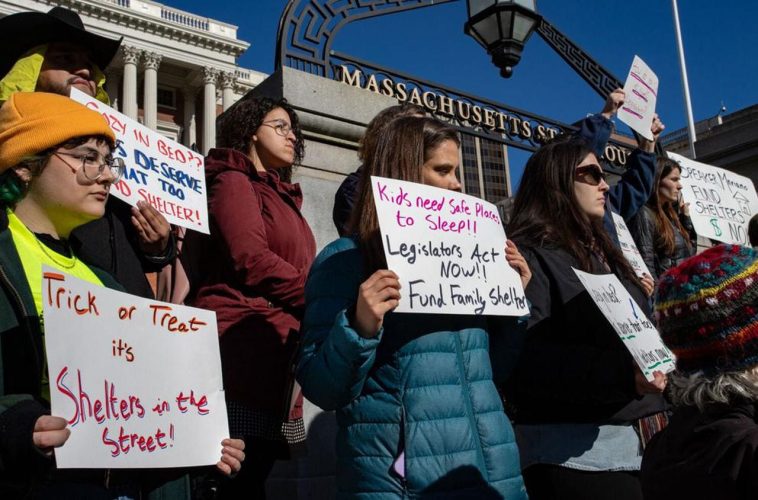Massachusetts is currently experiencing a significant challenge as the space available to accommodate recent arrivals from the border begins to fall short. This situation has led the authorities to propose a unique yet controversial solution, asked of its law-abiding homeowners. The state’s Governor, Maura Healey, has called upon residents to consider sharing their personal spaces with these new inhabitants, a response necessitated by the severity of the housing crisis.
As the only state with a comprehensive ‘right to housing’ legislation for homeless families, Massachusetts has a unique burden to carry. The situation intensified in August, when a ‘state of emergency’ was officially declared because of the ongoing influx of new arrivals. With the shelters stretched beyond capacity, there was no option but to explore unconventional approaches.
The magnitude of the issue came into sharp focus when it was reported that the number of individuals seeking shelter in the state had exceeded 20,000, which includes many families with children and expectant mothers. Governor Healey saw the dire situation as an opportunity to call for unity, proposing homeowners as the potential solution to house these new arrivals, despite it being a somewhat unorthodox solution.
This accommodation crisis has been steadily worsening, peaking in November 2023 when the state’s emergency homeless shelter system reached its threshold of 7,500 families. The pressure to find hosts for these families led both Governor Healey and her deputy, Lt. Governor Kim Driscoll, to urge residents to consider housing the migrants. Homeowners, they said, could play a crucial role in providing this most basic need.
As a part of the short-term solution, the state is temporarily sheltering over 1,400 families in several hotels spread across 28 cities – a measure which is entirely financed by the taxpayer’s money and without any charges levied on the new arrivals. The Federation for American Immigration Reform (FAIR) estimates that these families typically stay for around 14 months, which in many cases is free of charge.
While these hotel accommodations are helpful, they are not a long-term solution. As a result, the state is encouraging private sector entities to join the cause. Organizations like the Immigrant Support Alliance are participating, hosting seminars to inform residents about providing shelter to individuals awaiting their legal status determination in their homes.
Calls to make private homes a safe haven for these entrants, however, are raising questions about the authorities’ intentions. Is the state hoping to position such an arrangement as the new norm? The fact that Massachusetts is the only state with a mandated ‘right to housing’ policy fuels this speculation. This obligation, though, doesn’t extend to individual homeless people.
The rising demand for shelter underscores how overextended the existing housing system truly is. Indeed, Massachusetts stands out with its housing obligation mandate, even when compared to other states with similar laws. For instance, New York City only applies this right to emergency shelters, while California’s law extends it to homeless teens, regardless of parental consent.
The uniqueness of Massachusetts’ rule and its consequent financial burden has called into question the sustainability of the ‘right to housing’ policy. Within one year, Free housing provision went up from 15 families to almost 2,000. Such an astronomical rise led state Representative Peter Durant to question if the sharp increase in housing needs could mostly be attributed to the new arrivals without legal status.
The financial repercussions have certainly been felt; in 2023 the state’s expenditure on this cause was estimated at $2.6 million, a figure predicted to rise to $10.7 million by the end of 2024. This situation has fueled debates about the feasibility of the current housing law, and if it might be due for reform, given its increasing economic strain.
Moreover, there are concerns about how this opens up the door to potential public safety and health risks. Homeowners may lack the necessary information on their guests regarding criminal histories or potential public health hazards. The question of state responsibility for ensuring the safety of its residents is therefore a key point of debate.
Questions continue to linger about the limit of Governor Healey’s powers. Can she compel homeowners to house those without legal status based on the ‘right to housing’ law? Transparency regarding the scope of the law and how it applies in this case is urgently needed, but answers remain elusive.
With all these questions unanswered, citizens can only wait and watch how things unfold. Will Massachusetts be able to balance its responsibilities towards its residents while simultaneously maintaining the dignity and rights of the new arrivals? This is a multifaceted problem that calls for a multifaceted solution – and it’s clear that solving it will require more than just emergency measures. It is a test of resolve, unity, and the strength of the values that Massachusetts stands for.


